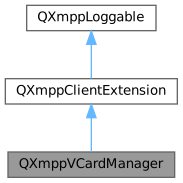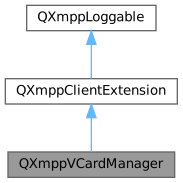The QXmppVCardManager class gets/sets XMPP vCards. It is an implementation of XEP-0054: vcard-temp. More...
#include <QXmppVCardManager.h>


Public Types | |
| using | Result = std::variant< QXmpp::Success, QXmppError > |
| Success or QXmppError. | |
| using | VCardIqResult = std::variant< QXmppVCardIq, QXmppError > |
| QXmppVCardIq or QXmppError. | |
Signals | |
| void | vCardReceived (const QXmppVCardIq &) |
| void | clientVCardReceived () |
 Signals inherited from QXmppLoggable Signals inherited from QXmppLoggable | |
| void | setGauge (const QString &gauge, double value) |
| Sets the given gauge to value. | |
| void | logMessage (QXmppLogger::MessageType type, const QString &msg) |
| This signal is emitted to send logging messages. | |
| void | updateCounter (const QString &counter, qint64 amount=1) |
| Updates the given counter by amount. | |
Public Member Functions | |
| QXmppTask< VCardIqResult > | fetchVCard (const QString &bareJid) |
| QXmppTask< Result > | setVCard (const QXmppVCardIq &) |
| QString | requestVCard (const QString &bareJid=QString()) |
| const QXmppVCardIq & | clientVCard () const |
| Returns the vCard of the connected client. | |
| void | setClientVCard (const QXmppVCardIq &) |
| Sets the vCard of the connected client. | |
| QString | requestClientVCard () |
| bool | isClientVCardReceived () const |
| Returns true if vCard of the connected client has been received else false. | |
 Public Member Functions inherited from QXmppClientExtension Public Member Functions inherited from QXmppClientExtension | |
| QXmppClientExtension () | |
| virtual QStringList | discoveryFeatures () const |
| virtual QList< QXmppDiscoveryIq::Identity > | discoveryIdentities () const |
| virtual bool | handleStanza (const QDomElement &stanza) |
| You need to implement this method to process incoming XMPP stanzas. | |
| virtual bool | handleStanza (const QDomElement &stanza, const std::optional< QXmppE2eeMetadata > &e2eeMetadata) |
| You need to implement this method to process incoming XMPP stanzas. | |
 Public Member Functions inherited from QXmppLoggable Public Member Functions inherited from QXmppLoggable | |
| QXmppLoggable (QObject *parent=nullptr) | |
Protected Member Functions | |
| void | onRegistered (QXmppClient *client) override |
| void | onUnregistered (QXmppClient *client) override |
 Protected Member Functions inherited from QXmppClientExtension Protected Member Functions inherited from QXmppClientExtension | |
| QXmppClient * | client () const |
| virtual void | setClient (QXmppClient *client) |
| void | injectIq (const QDomElement &element, const std::optional< QXmppE2eeMetadata > &e2eeMetadata) |
| bool | injectMessage (QXmppMessage &&message) |
 Protected Member Functions inherited from QXmppLoggable Protected Member Functions inherited from QXmppLoggable | |
| void | debug (const QString &message) |
| void | info (const QString &message) |
| void | warning (const QString &message) |
| void | logReceived (const QString &message) |
| void | logSent (const QString &message) |
Detailed Description
The QXmppVCardManager class gets/sets XMPP vCards. It is an implementation of XEP-0054: vcard-temp.
- Note
- Its object should not be created using its constructor. Instead
QXmppClient::findExtension<QXmppVCardManager>()should be used to get the instantiated object of this class.
Getting vCards of entries in Roster:
It doesn't store vCards of the JIDs in the roster of connected user. Instead client has to request for a particular vCard using requestVCard(). And connect to the signal vCardReceived() to get the requested vCard.
Getting vCard of the connected client:
For getting the vCard of the connected user itself. Client can call requestClientVCard() and on the signal clientVCardReceived() it can get its vCard using clientVCard().
Setting vCard of the client:
Using setClientVCard() client can set its vCard.
- Note
- Client can't set/change vCards of roster entries.
Member Function Documentation
◆ clientVCardReceived
|
signal |
This signal is emitted when the client's vCard is received after calling the requestClientVCard() function.
◆ fetchVCard()
| QXmppTask< QXmppVCardManager::VCardIqResult > QXmppVCardManager::fetchVCard | ( | const QString & | bareJid | ) |
Fetches the VCard of a bare JID.
- Since
- QXmpp 1.8
◆ onRegistered()
|
overrideprotectedvirtual |
Called after the extension has been added to a QXmppClient.
- Parameters
-
client
Reimplemented from QXmppClientExtension.
◆ onUnregistered()
|
overrideprotectedvirtual |
Called after the extension has been removed from a QXmppClient.
- Parameters
-
client
Reimplemented from QXmppClientExtension.
◆ requestClientVCard()
| QString QXmppVCardManager::requestClientVCard | ( | ) |
This function requests the server for vCard of the connected user itself. Once received the signal clientVCardReceived() is emitted. Received vCard can be get using clientVCard().
◆ requestVCard()
| QString QXmppVCardManager::requestVCard | ( | const QString & | jid = QString() | ) |
This function requests the server for vCard of the specified jid. Once received the signal vCardReceived() is emitted.
- Parameters
-
jid Jid of the specific entry in the roster
◆ setVCard()
| QXmppTask< QXmppVCardManager::Result > QXmppVCardManager::setVCard | ( | const QXmppVCardIq & | vCard | ) |
Sets the VCard of the currently connected account.
- Since
- QXmpp 1.8
◆ vCardReceived
|
signal |
This signal is emitted when the requested vCard is received after calling the requestVCard() function.
The documentation for this class was generated from the following files:
- QXmppVCardManager.h
- QXmppVCardManager.cpp